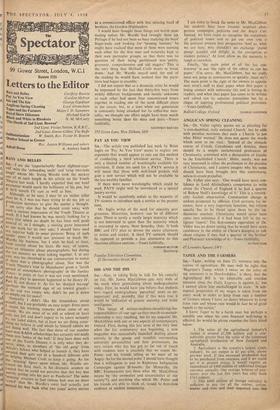Letters to the Editor
it Pay As You View Gordon Mcl vor Anglican Spring Cleaning Lord A Itrinchant TaPer and the Farmers Major). D. Summers Royal Show Dilemma Michael Gavin 'lack and White in Rhodesia N. M. McCarty
ists and The Isis George Gardiner
Bats and Belles Geoffrey Reeves
I he Death of 2nd Lieut. Browne'
2nd Lieut. Vivian Sutton, K.R.R.C., 2nd Lieut. Simon Gillett, The Buffs Sabbatarianism W. Smith, Rev. Victor H. Beaton Quaker School in Greece
Rev. Austen Williams and others
Athol! Brose A. A mbery Smith rt 8ATS AND BELLES • i4 SIR,---1 am the 'imperturbably fluent eighteen-year- t. old' with the 'unbending smile' and 'crisp two-note It laugh' whom Mr. Irving Wardle took the mickey Is out of at such length in his article on the Youth id Theatre last week. I hardly expected that our brief
encounter would merit the brilliance of his pen, but Is if he'll mouth I'll rant as well as him. IC Although, as he says, I may be six inches taller
than io he is, I was too ,busy trying to do my job as
Production secretary to give the matter a thought.
I am sorry also that he should come away with such a curious impression of the Youth Theatre at work. If I had known he was merely looking for a story (for which no doubt he has been well Paid) instead of, as I thought, a visiting guest interested in our work for its own sake, I should have used nlY superior bulk to some purpose. Being of such tender years I would not presume to teach Mr. Wardle his business, but I wish he had, at least, been careful about his facts. He may, of course, have an obsession about photographers, but during the ten minutes we were talking together, I, at any rate, was too absorbed in our conversation to notice if there was a photographer about. Nor was the Youth Theatre's visit to Manchester given a 'lavish spread of atmospheric photographs' in the Sunday Times: in point of fact it was not even mentioned. And the play in question happened to be Henry IV, Part 11, not Henry V. As for his 'drained tea-cup' (perhaps the outward sign of an inward grace)— if the cup was empty why didn't he put it down Or simply ask for more?
Naturally I didn't like his innuendoes about myself, but I am probably an easy target. Even more I resent his bitching remarks about some of my friends. We are most of us still at school or have
111 0. Illy just left and don't expect to be taken seriously by our jaded elders, but at least we are doing some- thing we believe in and which he himself admits we are doing well. The fact that three of our number have won RADA scholarships has certainly not made them into 'belles of the ball.' If they have done well out of the Youth Theatre it is only what they de- serve, since, as members of 'the old gang' from Alleyn's School who helped to launch it, they have rveated their guts out in a hundred different jobs 1 helping Michael Croft to keep it going. As for the 'mincing figure upon whom Mr. Wardle un- loosed his final shaft, is his dramatic acumen so limited that he could not perceive that this boy was 'merely getting into his part as Pandarus? The same
‘,. 'mincing' creature in fact (whose hair was no more styled' than Mr. Wardle's own) had actually just -e• minced his way back after two years' active service as a commissioned officer with that mincing band of brothers, the Gordon Highlanders.
I would have thought these things not worth men- tioning unless Mr. Wardle had brought them up. Perhaps if he had not been so busy studying the boys' finger-nails and looking for 'missing buttons,' he might have realised that most of them were meeting each other for the first time and naturally kept to their own particular groups, so that there was no question of their being partitioned into 'public, grammar, comprehensive and old stagers.' This is. the very thing that Michael Croft wants to break down : had Mr. Wardle stayed until the end of the reading he would have noticed that the parti- tions had begun to crumble.
I did not expect that as a dramatic critic he would be impressed by the fact that thirty-five boys from widely different backgrounds and mostly unknown to each other had spent four concentrated hours together in reading one of the most difficult plays in the canon; hut, at a time when our generation is constantly being attacked for its coffee-bar men- tality, we thought our effort might have been worth something better than his slurs and jeers.—Yours faithfully,
GEOFFREY REEVES






















































 Previous page
Previous page